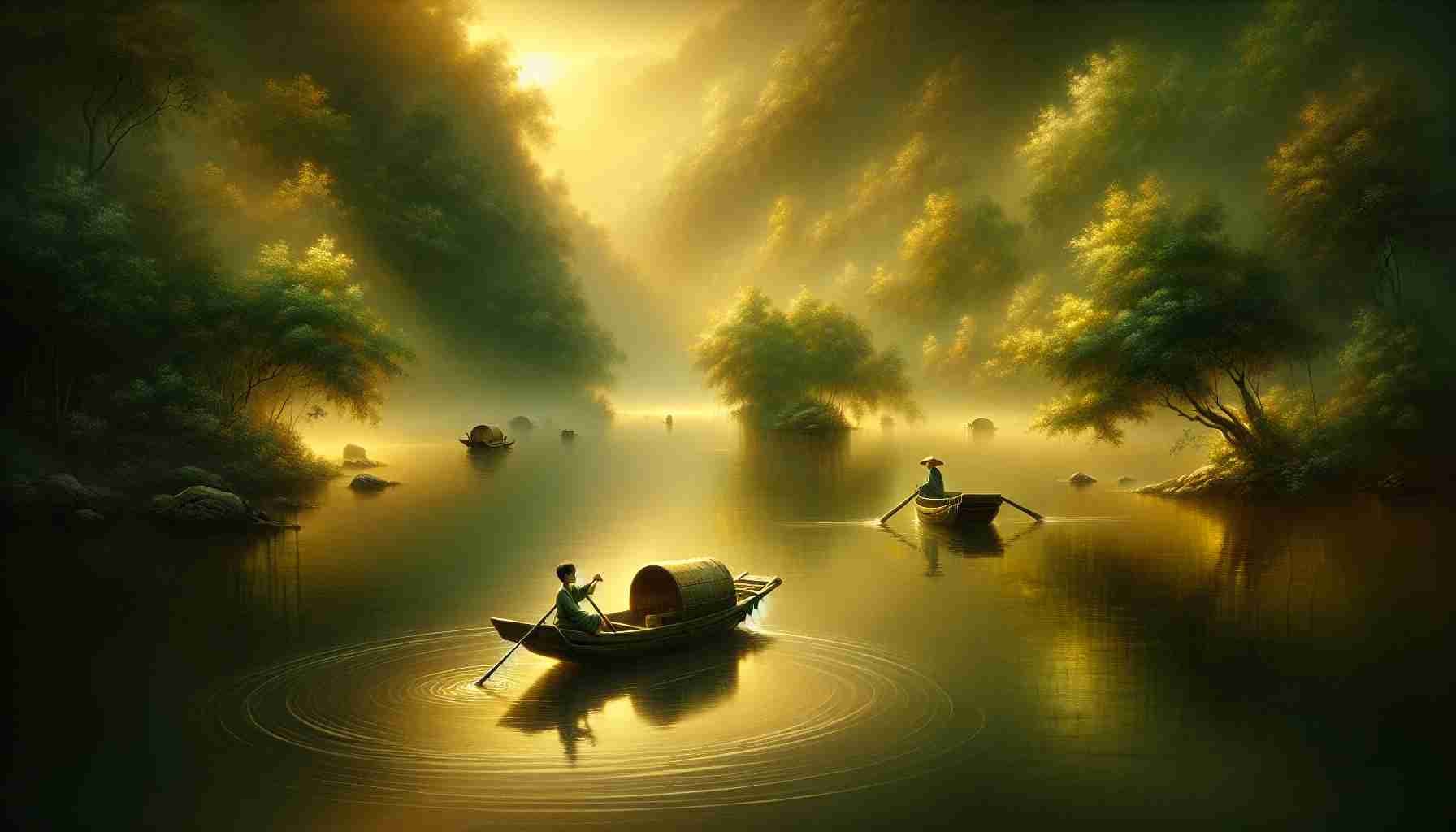

The sun was hot above the river, and my arms ached from rowing. My name is Lin, and I was just eleven years old, trying to help Father ferry rice across the water. That day, the wind had stopped, the heat pressed down, and I was angry.
"I hate this job," I muttered. "Why do I always have to row?"
Father said nothing. He just kept his eyes on the water. It wasn’t fair. My friends were playing near the shore, and here I was, tasting sweat instead of sweet cakes.
Just then, something bumped against the side of our boat—hard.
“Be careful!” I shouted before even looking. “Why did you hit us?!”
But Father held up a hand quietly. We both looked over. It was an empty boat. No one was inside. It must’ve drifted free from the dock.
Father smiled softly. “Strange, isn’t it? You got so angry, but there’s no one to blame.”
“It still hit us,” I grumbled.
“Yes,” he nodded. “But it didn’t mean to.”
We tied the empty boat to ours, planning to bring it back to the village. But as we floated back down the calm river, Father told me an old story.
“A long time ago,” he said, “a man sat in his boat, resting in the middle of the river. Suddenly, another boat struck his. The man leapt up, full of rage. He was ready to shout, ready to argue. But when he looked inside the boat—it was empty.”
My eyes widened. “Like today?”
“Exactly,” Father said. “The man didn’t shout. There was no one to be angry with. He laughed instead, because he understood something. His anger wasn’t caused by another person. It was inside him all along.”
I sat quietly, thinking.
Father continued. “Zhuangzi, a wise Taoist teacher, shared that story hundreds of years ago in ancient China. He lived simply, believed in balance, and trusted the flow of nature. This story teaches Wu Wei—doing without forcing. Sometimes, we must let things happen without fighting them.”
I looked at the boat. It hadn’t tried to hurt us. It just floated with the river’s current.
“Can I row again?” I asked. “But slower this time?”
Father smiled and handed me the oar. “Good,” he said. “When we row with ease, we move with the river, not against it.”
The breeze picked up. The water shone golden in the afternoon light. I dipped the oar gently. We glided forward without a splash. My heart felt lighter.
That day, I began to understand that not everything needs a reaction. Some boats float empty. Some problems solve themselves. And some burdens are lighter when we stop trying so hard.
I didn’t change overnight. But now, whenever I get upset, I remember the empty boat. I ask myself if there's really something to be angry about—or if I can just let it go, and float with the Tao.
And most days, that small truth helps me find peace.
The sun was hot above the river, and my arms ached from rowing. My name is Lin, and I was just eleven years old, trying to help Father ferry rice across the water. That day, the wind had stopped, the heat pressed down, and I was angry.
"I hate this job," I muttered. "Why do I always have to row?"
Father said nothing. He just kept his eyes on the water. It wasn’t fair. My friends were playing near the shore, and here I was, tasting sweat instead of sweet cakes.
Just then, something bumped against the side of our boat—hard.
“Be careful!” I shouted before even looking. “Why did you hit us?!”
But Father held up a hand quietly. We both looked over. It was an empty boat. No one was inside. It must’ve drifted free from the dock.
Father smiled softly. “Strange, isn’t it? You got so angry, but there’s no one to blame.”
“It still hit us,” I grumbled.
“Yes,” he nodded. “But it didn’t mean to.”
We tied the empty boat to ours, planning to bring it back to the village. But as we floated back down the calm river, Father told me an old story.
“A long time ago,” he said, “a man sat in his boat, resting in the middle of the river. Suddenly, another boat struck his. The man leapt up, full of rage. He was ready to shout, ready to argue. But when he looked inside the boat—it was empty.”
My eyes widened. “Like today?”
“Exactly,” Father said. “The man didn’t shout. There was no one to be angry with. He laughed instead, because he understood something. His anger wasn’t caused by another person. It was inside him all along.”
I sat quietly, thinking.
Father continued. “Zhuangzi, a wise Taoist teacher, shared that story hundreds of years ago in ancient China. He lived simply, believed in balance, and trusted the flow of nature. This story teaches Wu Wei—doing without forcing. Sometimes, we must let things happen without fighting them.”
I looked at the boat. It hadn’t tried to hurt us. It just floated with the river’s current.
“Can I row again?” I asked. “But slower this time?”
Father smiled and handed me the oar. “Good,” he said. “When we row with ease, we move with the river, not against it.”
The breeze picked up. The water shone golden in the afternoon light. I dipped the oar gently. We glided forward without a splash. My heart felt lighter.
That day, I began to understand that not everything needs a reaction. Some boats float empty. Some problems solve themselves. And some burdens are lighter when we stop trying so hard.
I didn’t change overnight. But now, whenever I get upset, I remember the empty boat. I ask myself if there's really something to be angry about—or if I can just let it go, and float with the Tao.
And most days, that small truth helps me find peace.